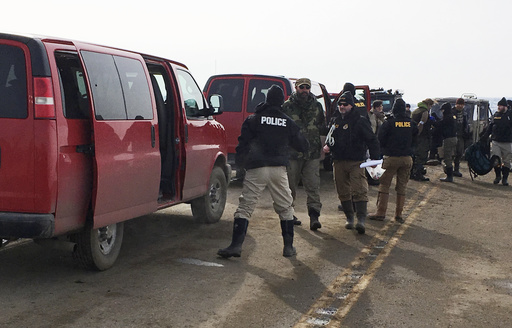CANNON BALL, N.D. (AP) — Authorities on Thursday cleared a protest camp where opponents of the Dakota Access oil pipeline had gathered for the better part of a year, searching tents and huts and arresting three dozen holdouts who had defied a government order to leave.
It took 3 ½ hours for about 220 officers and 18 National Guardsmen to methodically search the protesters’ temporary homes and arrest people, including a man who climbed atop a building and stayed there for more than an hour before surrendering.
Native Americans who oppose the $3.8 billion pipeline established the Oceti Sakowin camp last April on federal land near the Standing Rock Indian Reservation to draw attention to their concerns that the project will hurt the environment and sacred sites — claims Dallas-based pipeline developer Energy Transfer Partners disputes. The camp gained increased attention starting in August after its population had grown and authorities made their first arrests. At its height, the camp included thousands of people, but the numbers had dwindled during the winter and as the fight over the pipeline moved into the courts.
The Army Corps of Engineers said it needed to clear the camp ahead of spring flooding, and had ordered everyone to leave by 2 p.m. Wednesday. The agency said it was concerned about protesters’ safety and about the environmental effects of tents, cars, garbage and other items in the camp being washed into nearby rivers.
Most protesters left peacefully Wednesday, when authorities closed the camp, but some stayed overnight in defiance of the government order.
As police in full riot gear worked to arrest the stragglers Thursday, cleanup crews began razing buildings on the square-mile piece of property at the confluence of the Cannonball and Missouri rivers.
Protesters maintain the camp is on land that rightfully belongs to American Indians under old treaties. The Indigenous Environmental Network, which once had a strong presence in the camp, denounced the eviction of those who remained. Executive Director Tom Goldtooth said it “is a continuation of a centuries-old practice, where the U.S. government forcefully removes Indigenous people from our lands.”
Authorities entered the camp “cautiously and tactfully” to ensure the safety of officers and protesters, according to Highway Patrol Lt. Tom Iverson. The arrests were a last resort, he said.
“We did not want this. Unfortunately, there were some bad actors that forced us into this position,” he said.
Only one person resisted arrest; otherwise there were no major incidents, and there were no injuries, Morton County Sheriff Kyle Kirchmeier said.
Afterward, officers showed visible relief, smiling, shaking hands and patting one another on the back.
Guardsmen and officers entered the camp from two directions shortly before midday, alongside numerous law enforcement and military vehicles and with a helicopter and airplane overhead. As they checked and cleared buildings, they marked them with a fluorescent orange “X.”
They declared the camp cleared shortly after 2 p.m., though Morton County Sheriff Kyle Kirchmeier said 15 protesters crossed the frozen Cannonball River on foot to the south bank. That land also is Corps-managed but is on the Standing Rock Reservation, where North Dakota authorities don’t have jurisdiction. They planned to station officers on the north shore to keep anyone from re-entering the camp.
Before authorities moved in, Gov. Doug Burgum had said those remaining at the camp still had a chance to leave without facing charges. The state sent a bus to the site on Thursday to transport anyone to Bismarck, where officials were doling out basic necessities, along with hotel and bus vouchers.
No one took advantage of the offer Thursday, and only nine people used the center Tuesday and Wednesday. The center was closed Thursday due to the lack of use, state Emergency Services spokeswoman Cecily Fong said.
Energy Transfer Partners began work on the last big section of the oil pipeline this month after the Army gave it permission to lay pipe under a reservoir on the Missouri River. When complete, the pipeline will carry oil through the Dakotas and Iowa to a shipping point in Illinois.
___
Nicholson reported from Bismarck, N.D. Follow him on Twitter at: http://twitter.com/NicholsonBlake
Copyright 2017 The Associated Press. All rights reserved. This material may not be published, broadcast, rewritten or redistributed.






